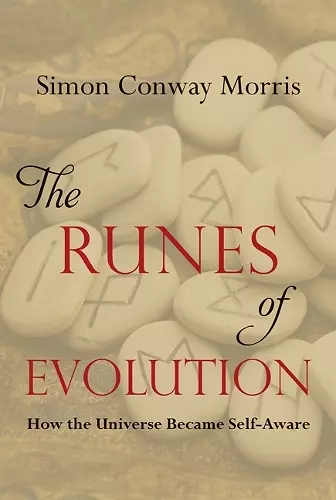The Runes of Evolution
How the Universe became Self-Aware
Format:Hardback
Publisher:Templeton Foundation Press,U.S.
Published:22nd Jun '15
Currently unavailable, our supplier has not provided us a restock date

This insightful exploration of evolution reveals how predictable outcomes arise through convergence, as articulated in The Runes of Evolution by Simon Conway Morris.
How did humans develop the ability to imagine scenarios that do not exist? What led to the Universe becoming self-aware? In The Runes of Evolution, Simon Conway Morris offers a refreshing perspective on the study of evolution, focusing on the concept of convergence. He presents compelling evidence that suggests the history of life is more predictable than previously believed. As a prominent evolutionary biologist at the University of Cambridge, Conway Morris gained recognition for his research on the Cambrian explosion, particularly the Burgess Shale fossils, and the phenomenon of evolutionary convergence, where unrelated organisms develop similar traits due to adapting to comparable environments.
In The Runes of Evolution, the author illustrates how the prevalence of convergence implies an underlying framework that suggests many outcomes, including the emergence of brains and intelligence, are likely on any Earth-like planet. He also highlights the intricate complexity of advanced biological systems that can be traced back to microbial forms. By broadening the scope of inquiry, the book delves into various overlooked evolutionary questions, such as why certain evolutionary traits, like parasitism and carnivory, are concentrated in specific taxonomic hotspots.
The exploration leads to unexpected insights, prompting intriguing questions about the natural world. For instance, do bees dream? What is the relationship between mantis shrimps and submarines? If dinosaurs had not faced extinction, what might have unfolded? Through these discussions, Conway Morris emphasizes that evolution is not a linear process but rather an exploratory journey through a vast biological landscape. The Runes of Evolution stands as a significant synthesis of the concept of evolutionary convergence, enriching our understanding of life's diversity.
"The runes of evolution spell out a surprising message: Some evolutionary outcomes are virtually inevitable. Or, so goes the argument of Cambridge palaeontologist Simon Conway Morris, resting on two key premises:
- Evolution repeats itself in unexpected ways: Very different lineages evolve to have similar traits. Conway Morris calls this 'convergence.'
- Precursors of complex traits, such as a nervous system, are found in much simpler organisms. Conway Morris calls this 'evolutionary inherency.' The premises are supported with a wealth of data—thousands of references across the book’s 27 chapters.
The intriguing tale is told by way of a journey over many different areas in which we find convergence and inherency, with touches of humour along the way." —Zachary Ardern, BioLogos
“Conway Morris’s exploration of the phenomenon of convergence in biological evolution is rife with implications for Christian theology. It lends credence to a Christian view of God’s providential action in history, and it supports an ecological view of the interdependence of all things in God’s creation. It also fits with a scriptural account of a story-shaped world.” —Ian Curran, Christian Century
"This is a very good book. The author is most effective when presenting his evidence as both glaringly obvious and unfairly maligned. Not everyone will like the volume’s familiar tone, but the overall excellence of the writing is hard to deny. Many of the book’s grandest ideas were already covered in his previous publications, but The Runes of Evolution is nevertheless Conway Morris’ most comprehensive statement on convergence to date, and is thus well worth reading." —Abraham H. Gibson, Quarterly Review of Biology (September 2017)
This book was presumably written by Morris more for fellow natural scientists than for philosophers and theologians, but in each case so as to prove that his hypothesis of ongoing convergence in evolution is not a series of fortuitous coinci-dences but empirical evidence of established patterns or in-built mechanisms within the evolutionary process. Three hundred pages of text with double columns of print on each page and 150 pages of endnotes make that clear. Names of different species, genera, families, orders, classes, and so on turn up on virtually every page so that the nonprofessional reader ends up hunting for summary statements by Morris at the end of each major subdivision within the 26 chapters. Yet despite its obvious density and degree of detail for the ordinary reader, the implications of this book for philosophical/theological understanding of the God–world relationship and for the classic distinction between the natural and the supernatural within creation are in my judgment very significant. —Joseph A. Bracken, SJ, Xavier University, Cincin
ISBN: 9781599474649
Dimensions: 254mm x 178mm x 36mm
Weight: 1080g
528 pages
First Edition, 1